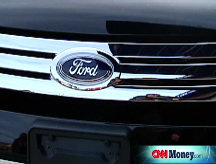Ford posts largest quarterly loss ever
Troubled automaker unveils plans to shift product line, bringing European-made vehicles to North America.
NEW YORK (CNNMoney.com) -- Ford Motor Co. announced plans to transform its vehicle lineup on Thursday and reported the largest quarterly loss in its 105-year history.
Ford's (F, Fortune 500) stock ended the session about 15% lower at $5.13 a share.
"Because of deteriorating economic conditions, demand has declined dramatically, especially in North America," said Ford CEO Alan Mulally, who also blamed rising gas prices for the decline.
Mulally said the company is working toward reducing its salaried workforce by 15%. The company aims to save $5 billion annually, and has managed to reduce costs by $1 billion so far.
He also said the company is now shifting its focus "to bring to the North American market smaller, more fuel-efficient vehicles that people increasingly want."
The company said it will make big changes to the vehicles it sells domestically - bringing six small cars made in Europe to the North American market.
Ford said that three large truck and sport utility vehicle plants in Wayne, Mich., Louisville, Ky., and Cuautitlan, Mexico would be switched over for the manufacture of small cars. Re-tooling will begin in December, the company said.
In addition to converting the three plants in North America, Ford said it will ramp up production of small utility vehicles at its Kansas City, Mo., assembly plant, including the Ford Escape, Escape Hybrid, Mercury Mariner and Mariner Hybrid.
Fortune: Can this car save Ford?
Mulally said that, in the second quarter, Ford rolled out two new vehicles - the Ford Flex, a "crossover" car-based SUV, and the Lincoln MKS luxury sedan. Mulally said these are the first vehicles with "eco boost" technology, providing better fuel economy.
Mark Warnsman, analyst for Calyon Securities, said that Ford has a "good plan" but "they've got to say in business long enough to make it work."
"They're not going to have these smaller vehicles in the U.S. until 2010 or 2011 and they're going to have to hustle to keep up with demand," said Warnsman, noting that Honda Motor (HMC) is Ford's top competitor in producing small, fuel-efficient cars.
As production winds down, Ford has been slashing production of SUVs and large trucks to meet the reduced demand, and delayed the launch of its new F-150. But some truck and SUV lines will continue, at least for now.
Ford said it will continue to produce the Ford Ranger through 2011 at its Twin Cities, Minn. plant, which was scheduled to close in 2009. The company also said it would shift production of the Ford Expedition and Lincoln Navigator to its Louisville plant from Wayne, Mich.
Tough quarter: Ford said it lost $8.7 billion, or $3.88 per share, in the second quarter, including pre-tax special charges primarily due to the write-down of assets. A year earlier, the automaker announced a profit of $750 million, or 31 cents per share.
Without charges, Ford reported a loss of $1.4 billion, or 62 cents per share, in the latest quarter.
Revenue, excluding special items, fell to $38.6 billion from $44.2 billion a year earlier.
Ford said the special items included $8 billion in write-offs stemming from the loss in value to Ford North American and its Ford Credit lease portfolio. For this, Ford blamed "deteriorating economic conditions."
Ford managed to beat analyst expectations on revenue, but missed on earnings. Analysts expected Ford to report a 14% drop in revenue to $34.6 billion, and a loss of 27 cents per share, without charges, according to consensus compiled by Thomson/First Call.
Hard-hit: Ford, like its American rival GM (GM, Fortune 500), has been hard-hit by economic weakness. In particular, rising gas prices have severely hampered consumer interest in big trucks and SUVs. In 2007, Ford lost its place as the No. 2 automaker in the U.S. to the Japanese automaker Toyota (TM).
Ford has been offering buyouts to the hourly employees among its 54,000-strong workforce. But only 4,200 workers accepted, far short of the company's goal. On Monday, Ford said that a new round of buyout and early retirement offers had been made to workers at 17 facilities.
On Wednesday, the rival U.S. automaker Chrysler also announced that it was cutting 1,000 salaried jobs.
Ford's stock has fallen 10% so far this year. But it still managed to outperform the S&P, which has dropped 12%.
Calyon has received compensation from Ford for non-investment banking services in the past 12 months. ![]()



